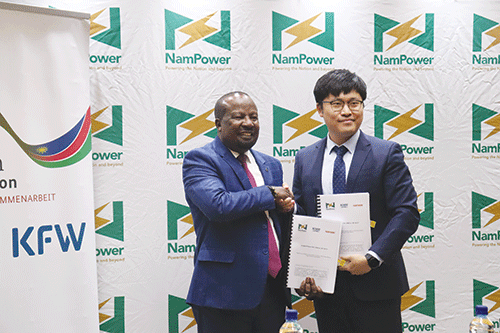Namibia is set to expand its power storage capacity in the energy sector with the introduction of the first-ever Omburu battery energy storage system (BESS).
“The BESS project will help government accomplish its goals by ensuring electricity supply security, cost efficiency and self-sufficiency,” said NamPower managing director Kahenge Haulofu yesterday.
This development, he said, will be a game changer and a transformative leap in the Namibian energy landscape and it will further shape how energy is generated and distributed in Namibia.
At the ground-breaking ceremony yesterday, which comprised the signing of the 54-megawatt (MW) BESS project engineering, procurement and construction contract in the capital, a joint venture between Shandong Electrical, Engineering & Equipment Group Co, Ltd
and Zhejiang Narada Power Source Co., Ltd JV, were confirmed the successful contractors.
The project is funded through a 20 million euro grant (about N$400 million), which was received from the German government.
It is project is expected to commence in late February 2024 or early March 2024.
Once commissioned, the Omburu BESS is expected to provide energy shifting, which the NamPower MD noted will enable the energy utility to cost-effectively manage energy demand and supply by charging the BESS during periods of low electricity prices and discharging during periods of high electricity prices.
“This will greatly lead to significant economic benefits for NamPower and in turn, the consumers, by reducing the reliance on expensive peaking plants and imports,” Haulofu explained.
Haulofu added the new storage system will greatly impact the provision of emergency energy. He noted that the project will alleviate challenges posed by under forecasting of energy demand which currently leads to sourcing of expensive emergency energy from South Africa’s electricity utility, Eskom and from SAPP.
On ancillary services, the BESS is expected to be used in facilitating, supporting and preserving power quality in the national electricity grid by providing services such as reactive power control, voltage control and ramp rate control as well as performing frequency control, which is a task that currently resides only with Eskom.
The new storage system will further play a significant role in transitioning towards a low carbon and environmentally sustainable energy system.
Representing the joint-venture contractors, Benny Jin promised to provide first-class technology, high-quality products, scientific management, and excellent services to make the Omburu energy storage power station a reality for Namibia.
Earlier this year, the Institute for Public Policy Research (IPPR) cautioned that while Namibia is making progress in building new electricity-generating capacity, progress is not fast enough, and will not be sufficient to completely replace imports. The IPPR stated this precarious situation is likely to last several years, at least until the end of the decade.
According to the research institute, 2022 saw Namibia being more reliant than ever on electricity imports.
“Namibia has long been a net importer of electricity from the Southern African Power Pool (SAPP) and has struggled over the decades to build new domestic generating capacity and become more independent. Despite greater renewable energy capacity, in 2022, Namibia imported more than 70% of the power required, as power supply from the key Ruacana Hydroelectric Power Station dwindled,” reads the IPPR’s quarterly economic review from January to March 2023.


